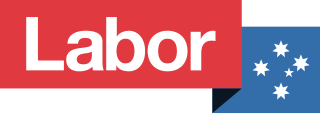See also
- New Labor Forum , a labor journal
- New labor history, a branch of labor history
New Labour was the campaigning label for the British Labour Party under Tony Blair's leadership.
New Labour may also refer to:

The Australian Labor Party (ALP), also simply known as Labor, is the major centre-left political party in Australia, one of two major parties in Australian politics, along with the centre-right Liberal Party of Australia. The party has been governing federally since being elected at the 2022 election, and with political branches in each state and territory, they are currently in government in New South Wales, Queensland, South Australia, Victoria, Western Australia, the Australian Capital Territory, and the Northern Territory – Tasmania is the only state or territory where they currently form the opposition. It is the oldest political party in Australia, being established on 8 May 1901 at Parliament House, Melbourne, the meeting place of the first federal Parliament.

Labour Day is an annual holiday to celebrate the achievements of workers. Labour Day has its origins in the labour union movement, specifically the eight-hour day movement, which advocated eight hours for work, eight hours for recreation, and eight hours for rest.
The Conservative Party is a name used by many political parties around the world. These political parties are generally right-wing though their exact ideologies can range from center-right to far-right.
B.A. or BA is an initialism standing for the Bachelor of Arts degree, a tertiary qualification.
A caucus is a meeting of supporters or members of a specific political party or movement. The exact definition varies between different countries and political cultures.
A green party is a political party based on the principles of green politics.
Democratic Labour Party may refer to:
A hung parliament is a term used in legislatures primarily under the Westminster system to describe a situation in which no single political party or pre-existing coalition has an absolute majority of legislators in a parliament or other legislature. This situation is also known as a balanced parliament, or as a legislature under no overall control (NOC), and can result in a minority government. The term is irrelevant/almost ubiquitous in multi-party systems and proportional representation systems where it is rare for a single party to hold a majority of the seats.
United Labour or United Labour Party may refer to:
The Fiji Times is a daily English-language newspaper published in Suva, Fiji. Established in Levuka on 4 September 1869 by George Littleton Griffiths, it is Fiji's oldest newspaper still operating.
A leadership election is a political contest held in various countries by which the members of a political party determine who will be the leader of their party.
The Fiji Trades Union Congress (FTUC) is a trade union organisation in Fiji that was founded in 1952 under the leadership of Pandit Ami Chandra as the Fiji Industrial Workers Congress (FIWC). As the FIWC the organisation was the third federation in Oceania, after the Australian Council of Trade Unions and the New Zealand Council of Trade Unions, to join the International Confederation of Free Trade Unions. In 1975 the FTUC's membership was 25,000. The FTUC is affiliated to the International Trade Union Confederation. It has a close relationship with the Fiji Labour Party. The FTUC has 30 trade union affiliates, covering the public and private sectors. Major affiliates include: the Fiji Public Service Association, the Fiji Teachers Union, the Fiji Sugar & General Workers Union, the National Union of Hospitality, Catering & Tourism Industries Employees and the National Union of Factory and Commercial Workers Union.
DLP may refer to:
Indo-Fijians also known as Indian Fijians are Fijian citizens of South Asian descent, and include people who trace their ancestry to various regions of India and the Indian subcontinent. Although Indo-Fijians constituted a majority of Fiji's population from 1956 through the late 1980s, discrimination and the resulting brain drain resulted in them numbering 313,798 (37.6%) out of a total of 827,900 people living in Fiji as of 2007.
Tom Bramble is a socialist activist, author and retired academic based in Queensland, Australia. He taught Industrial Relations at the University of Queensland for many years and has authored numerous books and articles on the Australian labour movement. He is a member of Socialist Alternative.
Labour Party or Labor Party is a name used by many political parties. Many of these parties have links to the trade union movement or organised labour in general. Labour parties can exist across the political spectrum, but most are centre-left or left-wing parties. The largest Labour parties, such as the UK Labour Party, Australian Labor Party, New Zealand Labour Party and Israeli Labor Party, tend to have a social democratic or democratic socialist orientation.

The impact of the Arab Spring concerns protests or by the way attempts to organize growing protest movements that were inspired by or similar to the Arab Spring in the Arab-majority states of North Africa and the Middle East, according to commentators, organisers, and critics. These demonstrations and protest efforts have all been critical of the government in their respective countries, though they have ranged from calls for the incumbent government to make certain policy changes to attempts to bring down the current political system in its entirety. In some countries, protests have become large or widespread enough to effect change at the national level, as in Armenia, while in others, such as Djibouti, were swiftly suppressed.

International Workers' Day, also known as Labour Day in some countries and often referred to as May Day, is a celebration of labourers and the working classes that is promoted by the international labour movement and occurs every year on 1 May, or the first Monday in May.
A ministry of labour (UK), or labor (US), also known as a department of labour, or labor, is a government department responsible for setting labour standards, labour dispute mechanisms, employment, workforce participation, training, and social security. Such a department may have national or regional authority.